Many of us provide our dogs with a regular stream of table scraps. While this may not be the most healthy diet to be feeding our dogs, the reality is that a lot of people do it anyway.
So if you are going to feed your German Shepherd food outside of its regular diet, you should be aware of some foods which may have not occurred to you that can be harmful to your dog.
Here is a list of 16 food items that can present serious issues for your German Shepherd if ingested.
Click Here to Jump to a Section
1.Chocolate
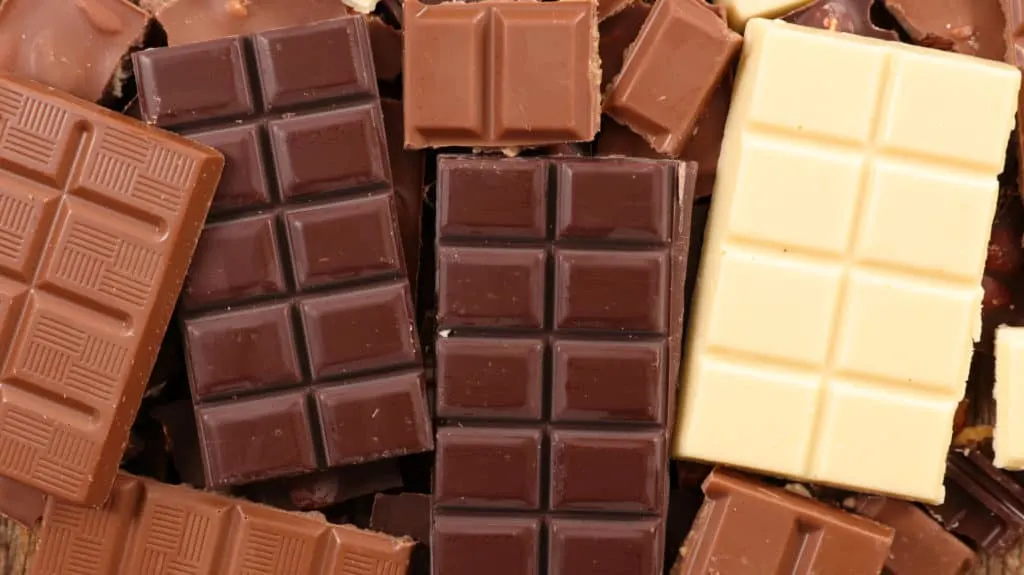
We’ve all heard that chocolate is bad for dogs. This is, in fact, true, and in large enough doses it can be deadly. But why is it bad?
Chocolate contains something called theobromine. This compound occurs naturally in the cocoa beans that are used in the making of chocolate.
If a human ingests too much chocolate, the only thing that will happen is they will become unhealthy and pay the price for that in the form of excess weight gain. And long-term indulging may lead to more significant health problems.
But it is very different for dogs, even a dog the size of a German Shepherd. Humans metabolize theobromine rather quickly, but dogs do not.
What ends up happening is that since the theobromine is not metabolized quickly, it builds up in the dog’s system. This can reach toxic levels quickly.
While it’s probably unlikely that you have pounds of milk chocolate lying around for your German Shepherd to ingest, it does not take that much for them to start to feel ill.
It doesn’t take much. Consider regular milk chocolate. It only takes a few ounces of milk chocolate before your dog may begin to feel ill. And 1 oz of it per pound of your German Shepherd’s weight can be fatal.
Symptoms if ingested:
- Increased thirst
- Vomiting
- Diarrhea
- Excessive panting
- Excessive urination
- Elevated heart rate
2. Coffee (Caffeine)

Caffeine is a stimulant. It’s in coffee, tea bags, soda, and energy drinks. It is also in the same chemical family as theobromine mentioned above.
If your German Shepherd ingests too much caffeine, it will display the same signs as chocolate poisoning. Thankfully, because of the size of a German Shepherd, it’s much less likely than a smaller dog to ingest a fatal dose. But nonetheless, avoid allowing your dog to have any caffeine under any circumstances.
Symptoms if ingested:
- Hyperactivity
- Shaking
- Restlessness
- Vomiting
3. Onions
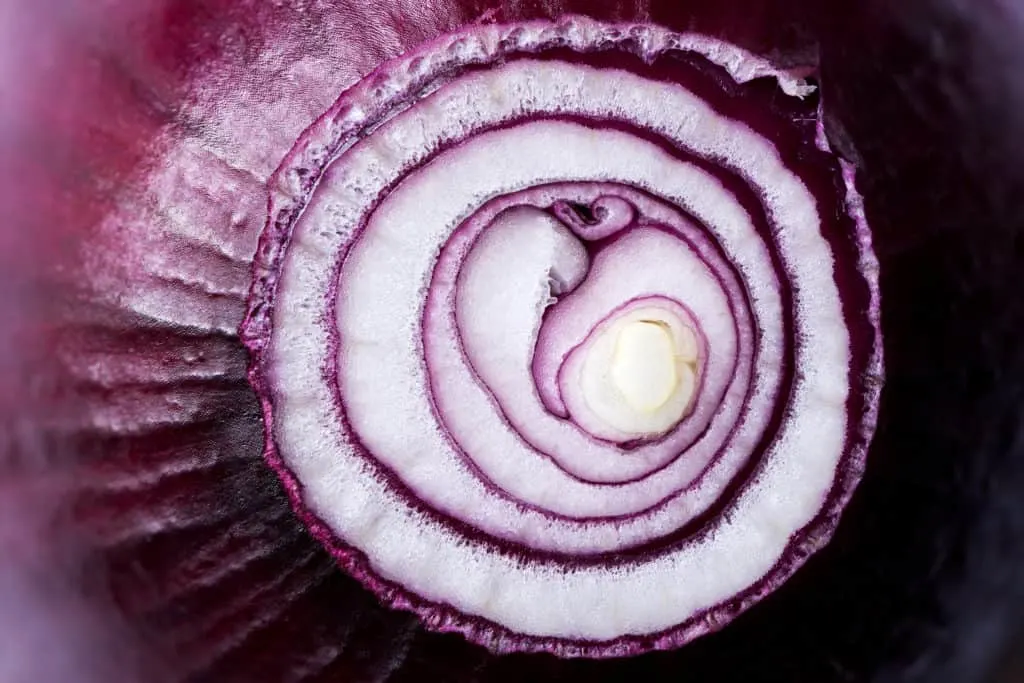
Onions contain Allyl propyl disulfide. In dogs, it breaks down their red blood cells and leads to anemia. Anemia is a lack of red blood cells, which are necessary to carry oxygen to the cells of your dog’s body.
The most alarming fact about onion toxicity to your German Shepherd is the wide array of foods containing onion that many of us are unaware of.
It may have been in the casserole that you had for dinner, it’s in soups, fast foods, and onion powder is used to season countless different dishes. Onion powders are concentrates, so are they are even more toxic than a fresh onion.
This means that your dog does not need to eat a physical onion to fall ill, just food that contains onion powder.
So make sure that if you are feeding your dog any table scraps that you know for sure that they contain no form of onion. Eating one large onion is enough to make an 80 lb German Shepherd begin to experience toxicity from it.
Symptoms if ingested:
- Decreased appetite
- Discolored reddish urine
- Pale gums
- Tiredness or even fainting
4 & 5. Raisins and grapes
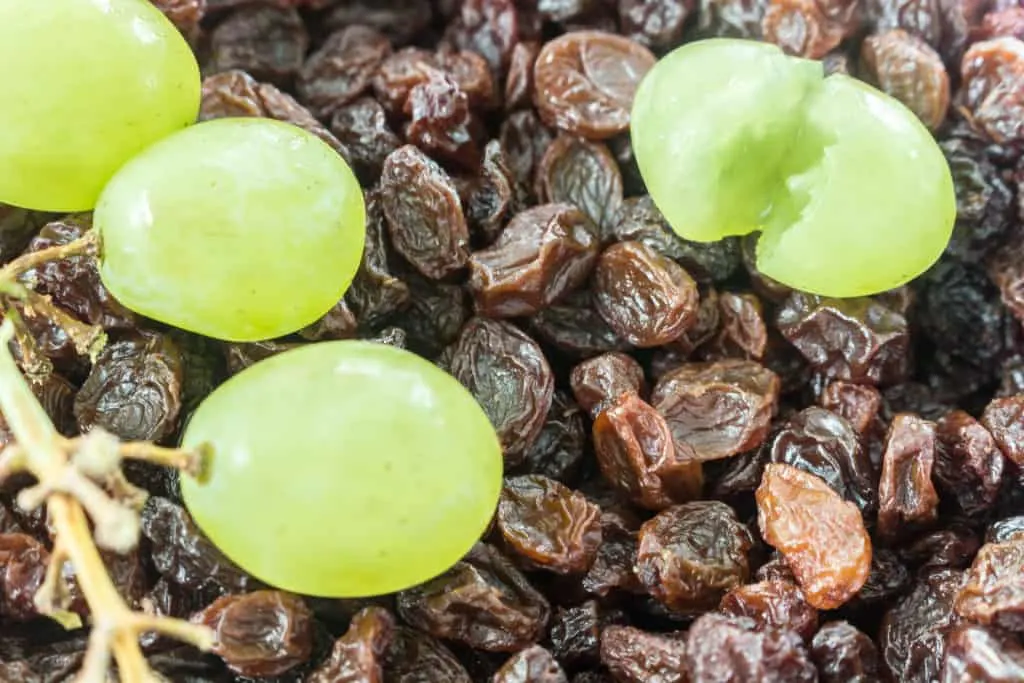
Science has not yet discovered the reasons why, but grapes and raisins are poisonous to dogs, and they should never ingest them even small amounts. Eating raisins or grapes affect your dog’s kidneys, and can actually lead to sudden kidney failure.
Some dogs are affected more than others, and some are not really affected at all. But it’s best to play it safe, just stay away from allowing your German Shepherd to have grapes or raisins at any time.
Symptoms if ingested:
- Vomiting
- Loss of appetite
- Suddenly being too quiet
- Diarrhea
6. Alcohol
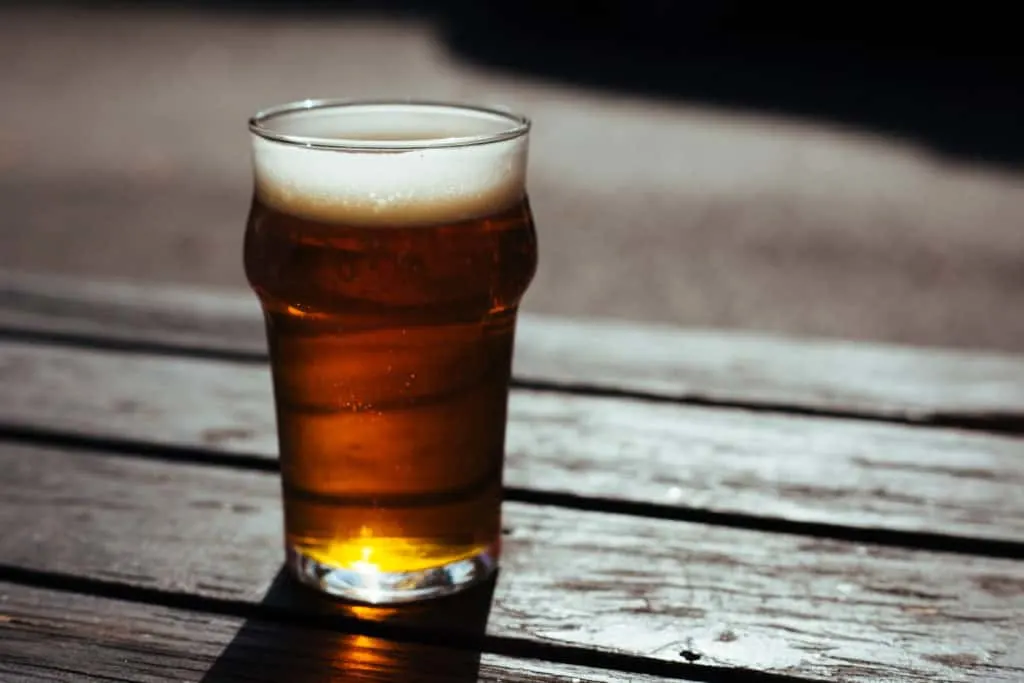
This is an absolute no for your German Shepherd. It’s rather unfortunate that a number of beer companies have used dogs as their mascot, when in fact alcohol can kill a dog.
And a dog does not need to consume a large amount of alcohol to begin feeling ill. While a German Shepherd is a larger dog and it would take more alcohol to give it an overdose than a smaller dog, refrain from doing so at all.
There are many accounts where people think it’s cute or funny to allow their dog to have a little bit of beer. This could end in vomiting, diarrhea, and it could be as severe as death.
Symptoms if ingested:
- Vomiting
- Diarrhea
- Disorientation
- Shortness of breath
- Panting
- Excessive salivation
- Excessive thirst
7. Moldy Foods
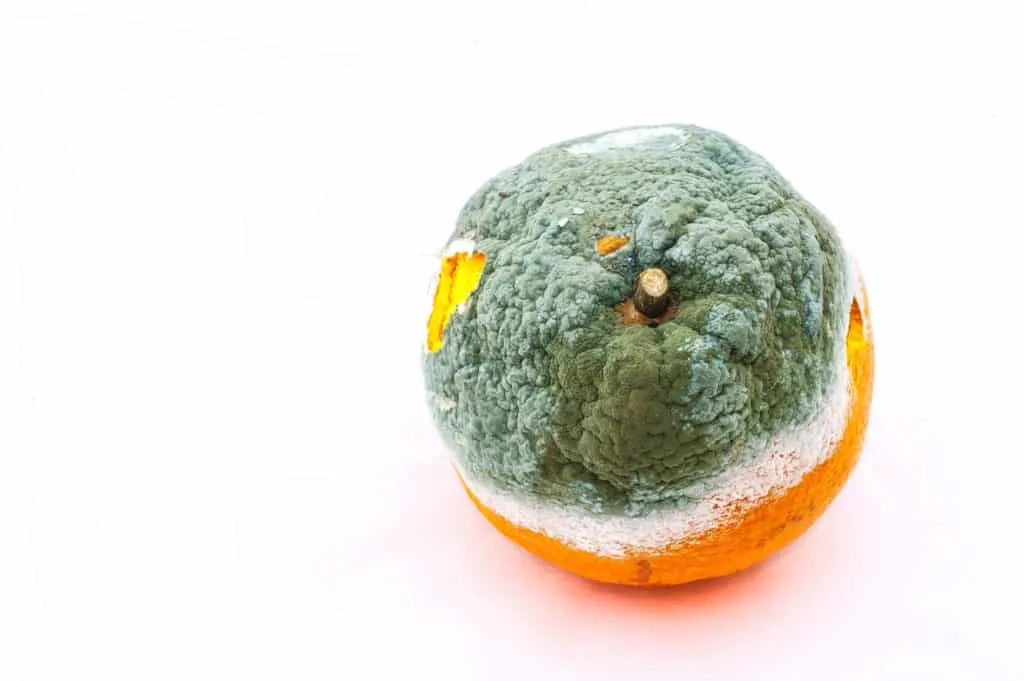
When we have foods that grow mold in our refrigerator, what do we do? We throw them in the trash. Now, this, unfortunately intersects with some of our dogs’ favorite pastimes, which is eating the trash.
Many foods have fungal neurotoxins growing on them that can make your dog very sick. Not only do you need to be aware of the trash inside your house that your dog may eat, but be aware of outside garbage as well.
Mold also loves to grow on fruits and nuts that have fallen from trees. So it is wise to be extra cautious while you are walking your German Shepherd, as they love to be curious and taste random things lying on the ground. Make sure that they are staying away from anything that could potentially have mold on it.
Symptoms if ingested:
- Vomiting
- Muscle tremors
- Diarrhea
- Fever
8. Xylitol
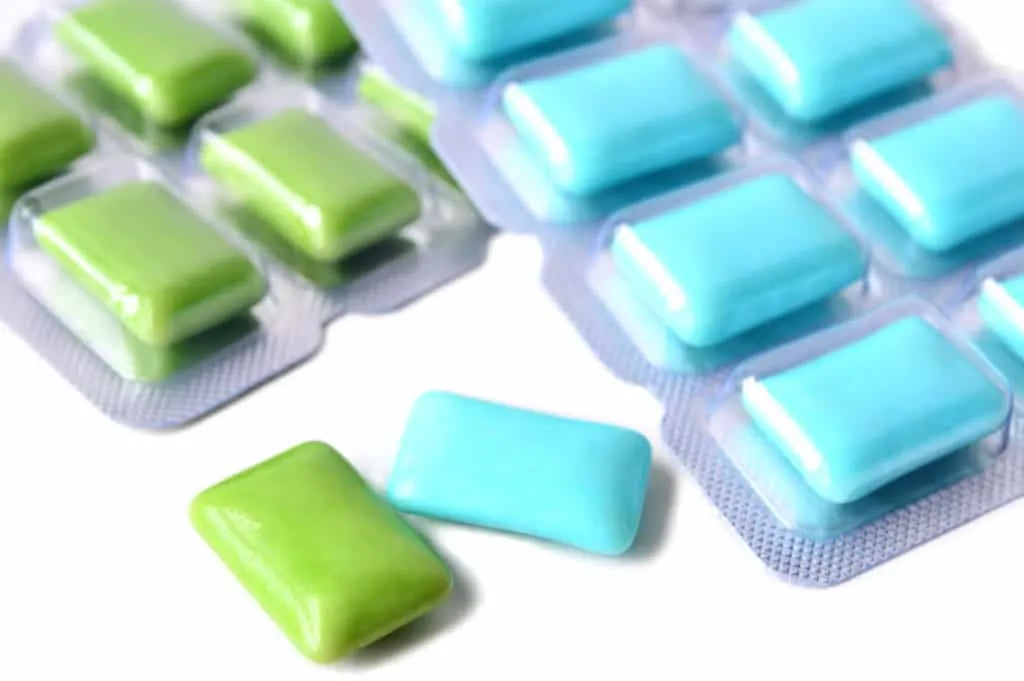
Xylitol is extremely popular. It’s an artificial sweetener that tastes like sugar and is used in gum, candy, snacks, medicines, mouthwash, and many other products.
Xylitol has certainly gained in popularity along with the number of people who are either intermittent fasting or on low-carb diets – but especially with intermittent fasting. Xylitol has been said to work well within intermittent fasting, as it does not spike insulin levels which break a fast.
So often people who are doing this type of fast will have Xylitol sweetened gum lying around. It’s especially important to make sure that none of this is within the reach of your dog.
While Xylitol does not cause an insulin increase in humans, it releases a potent amount in dogs. Dogs can develop hypoglycemia within 10 to 60 minutes of eating it.
At the pet poison helpline, the most common source of Xylitol poisoning in dogs is in fact from sugar-free gum. Depending on the type of gum and how much Xylitol it contains, it can take anywhere from only 2 to 9 pieces before a dog begins to experience severe hypoglycemia. And if the dog consumes more than this, there is the possibility of liver failure.
Symptoms if ingested:
- Depression
- Trembling
- Vomiting
- Seizures
- Yellow gums
- Black stool
- Diarrhea
9. Macadamia nuts
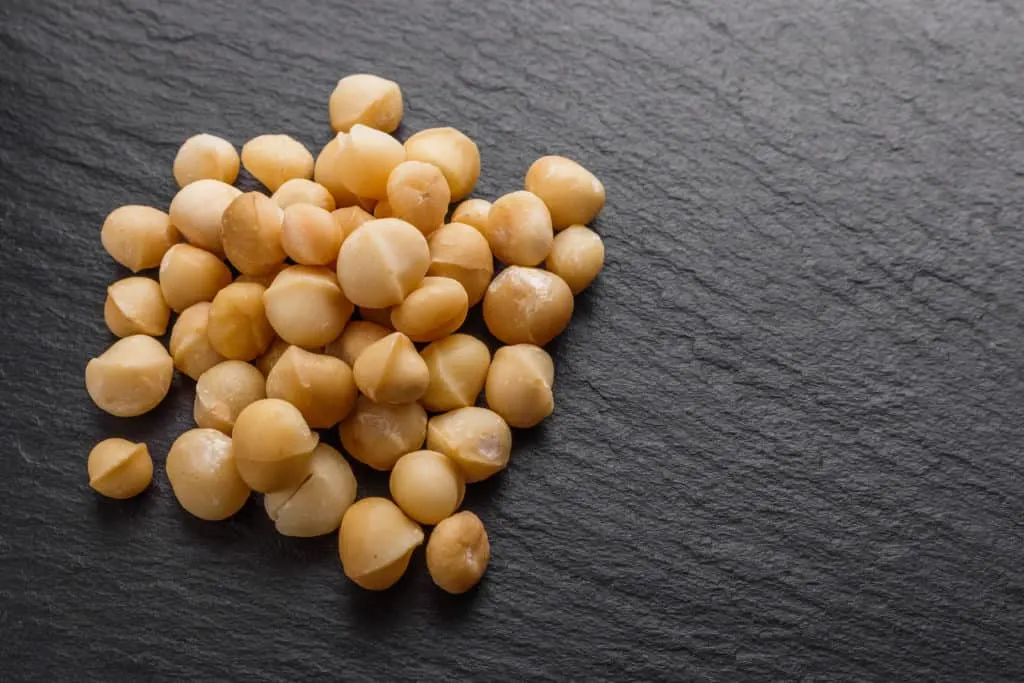
Not all nuts are the same. While a dog may safely eat peanuts, they should absolutely never consume macadamia nuts. Even the smallest amounts can be toxic to your German Shepherd.
With macadamia nuts, a German Shepherd’s size is not as much of a safety net as it may be if it ingests other foods that are toxic to it. According to the AKC, a dog can begin to show symptoms from having as little as one-tenth of an ounce per 2 pounds of its body weight.
Symptoms if ingested:
- Vomiting
- Diarrhea
- Shaking
- Fever
10. Yeast (dough)

While dogs are perfectly fine and safe with eating baked bread, unbaked bread is never something that you should allow your German Shepherd to eat.
The reason why unbaked bread is poisonous to your dog is that your dog’s stomach is actually the perfect environment for the dough to expand. As it expands, it can actually twist your dog’s stomach.
In addition to this, yeast ferments. And fermentation creates alcohol. As we have learned, alcohol is bad for your German Shepherd. From the fermented yeast, the alcohol is absorbed directly into the bloodstream and can result in alcohol poisoning.
So if you are making some pizza from scratch, or if you are baking bread, your dog is likely to be attracted to the smell. Make sure to keep the unbaked dough in a place that your dog cannot get to it.
Symptoms if ingested:
- Dry vomiting (nothing comes out)
- Distended abdomen
- Tiredness or weakness
11. Garlic
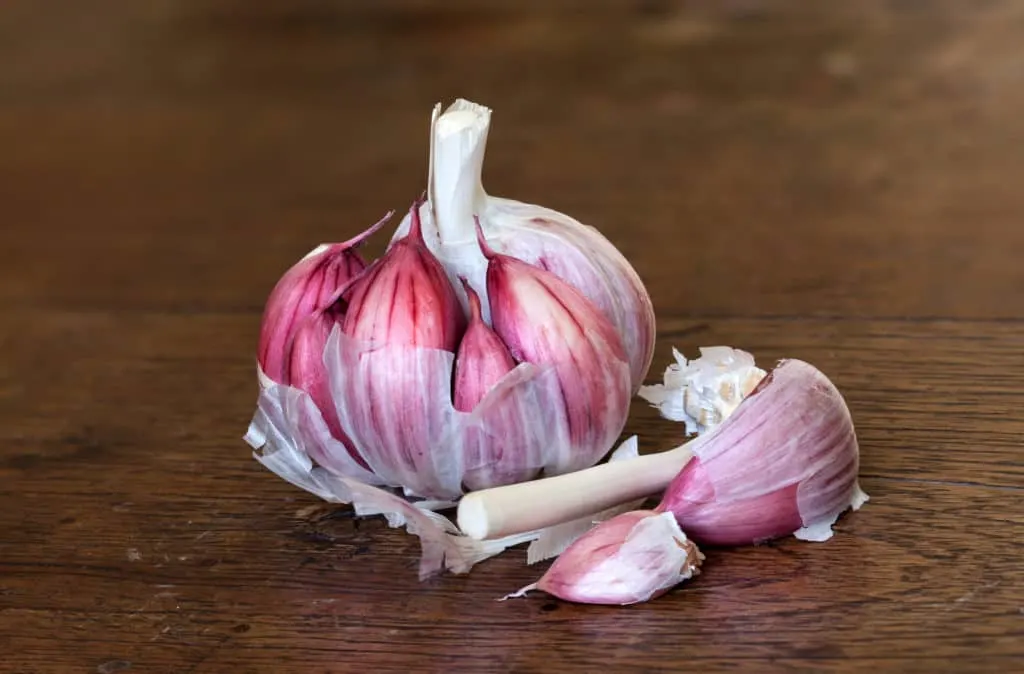
Garlic falls in the same family as onions. However, garlic can be as much as five times as potent as onions. And it does not take much time for a German Shepherd to just chop down on and swallow an entire head of garlic.
In fact, as you are opening up a head of garlic, that sound that it makes, sort of like rustling paper, may get your dog’s attention and pique its curiosity. So be extra careful that you store garlic in a jar, on a counter away from where your German Shepherd can reach.
Symptoms if ingested:
- Upset stomach
- Vomiting
- Diarrhea
- Loss of appetite
- Depression
12. Whole peaches
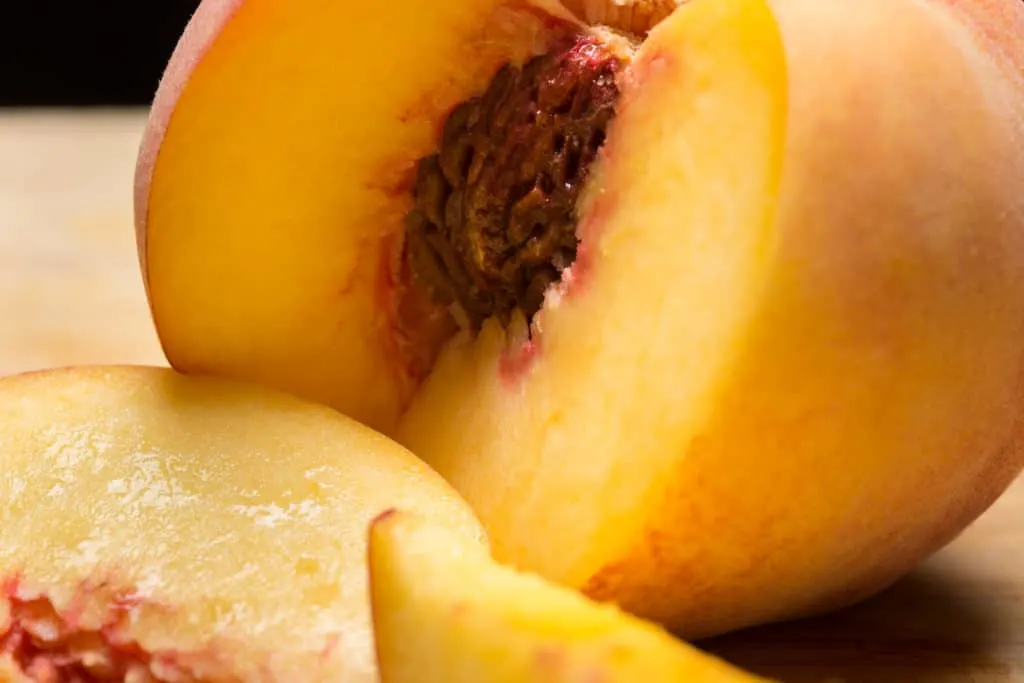
When it comes to peaches, the fruit itself is edible by your German Shepherd. In fact, it’s rather harmless and can be a tasty treat.
But stay away from canned peaches because they are preserved and packed with lots of sugar. Excess sugar may cause an upset stomach and diarrhea.
The real concern with peaches is the pit. The pit of a peach is not only a choking hazard for a dog, even a large German Shepherd, but it’s actually very poisonous.
A peach pit contains Amygdalin. Amygdalin is actually a sugar cyanide compound that is absolutely toxic to your dog. This is also contained in the leaves and stems of a peach.
Symptoms if ingested:
- Vomiting
- Drooling
- Hyperventilation
13. Whole avocados
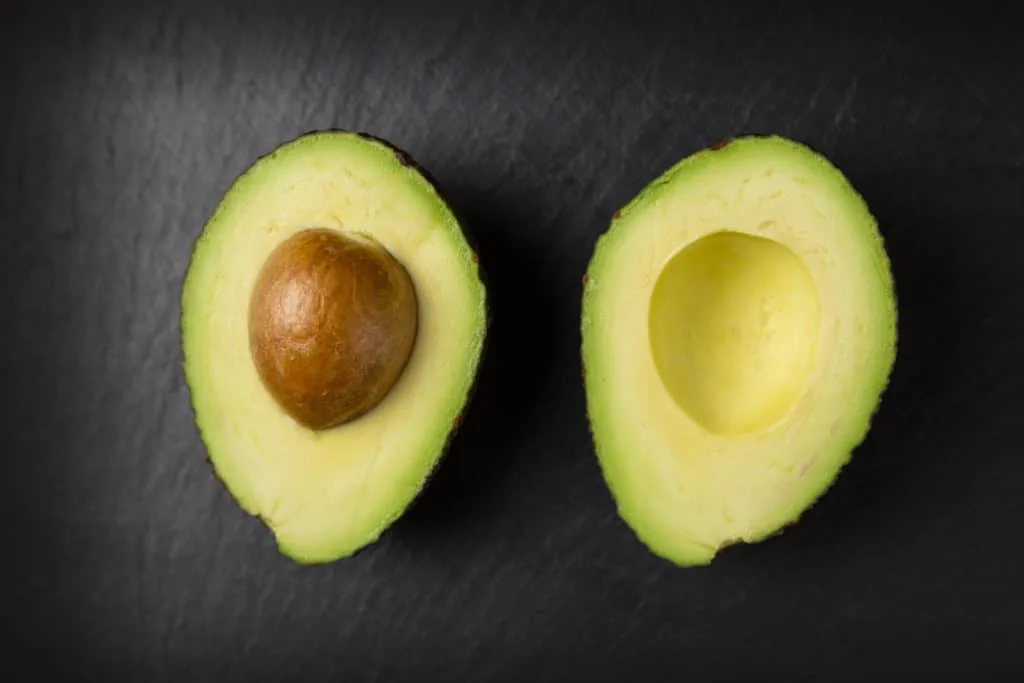
While eating an avocado is unlikely to be fatal to your German Shepherd, doing so can certainly cause it to feel ill.
This is because avocados contain Persin, a fungicidal toxin. It’s contained in every part of an avocado, from the pit to the actual plant, so every part can be harmful to your German Shepherd.
And don’t forget about the pit. If a German Shepherd swallows an avocado pit, it is very likely to choke on it. And if a German Shepherd gets its mouth on an avocado, you can be sure than it will most likely just eat the entire thing.
Symptoms if ingested:
- Vomiting
- Diarrhea
14. Bones
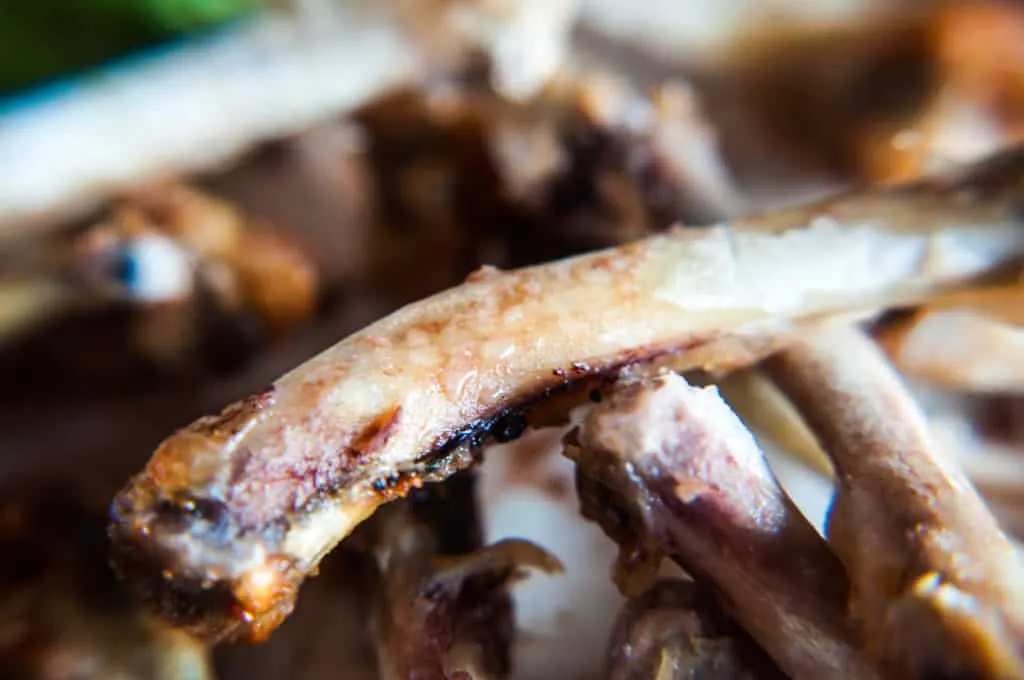
“Give the dog a bone, a common saying. But the reality is, “no, do not give the dog a bone!”
While bones may be a great source of minerals and other nutrients to supplement your German Shepherd’s diet, there are the right kinds of bones and the wrong kind of bones to give your dog.
Never give your German Shepherd a chicken bone or a pork bone. These bones splinter, and not only can they cause your dog to choke, the splinters can get lodged inside its mouth and esophagus.
A smaller dog may take a little while to actually chew a chicken bone to the point where it’s able to break it, and during this time the dog’s owner has the time to maybe intervene and stop it.
But with German Shepherd, you will not have this opportunity. If your dog gets a chicken bone in its mouth, it will just chew that bone as if it were a treat. Then you have nothing left to do except cross your fingers and hope that nothing happens.
The same is also true of cooked bones. Even beef bones, when cooked, not only lose their nutrients but are much more likely to splinter and harm your dog.
So if you are going to give your dog a bone, make sure that it is size appropriate. It must be much larger than your German Shepherd’s mouth, and you should limit the amount of time that your dog chews on it. No more than 15 minutes at a time.
15. Hops
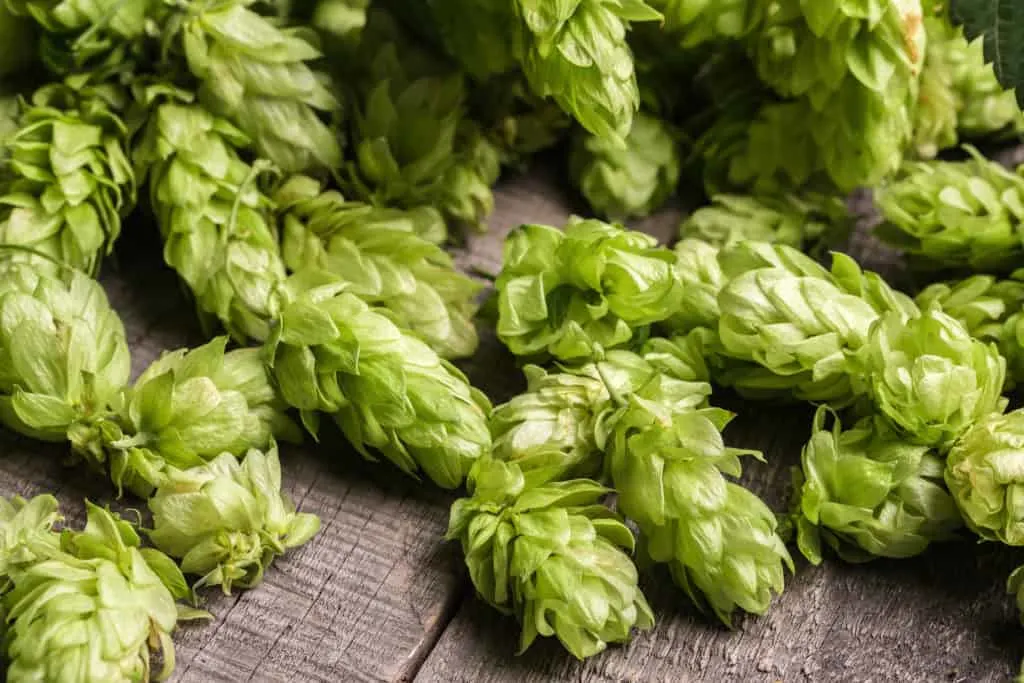
If you like to brew your own beer at home, as many of us do, you need to be extra cautious of the hops you use. If a dog eats hops, its body temperature can quickly jump up in excess of 102.5, which is the upper limit of normal body temperature for a German Shepherd.
In 2017, the Brewers Association stated that over 1 million people brewed their beer at home. So the odds are that you have at least a friend or two who brew their own beer.
If you take your dog to a friend’s house who brews his or her own beer, just be sure that you keep your eyes on it, and make others aware of the danger as well.
In addition, a lot of homebrewers have made the shift to growing their own hops outside. So be mindful when walking your dog or letting it run around outside if there are hops growing in the yard.
Symptoms if ingested:
- Fever
- Vomiting
- Diarrhea
16. Cherry pits
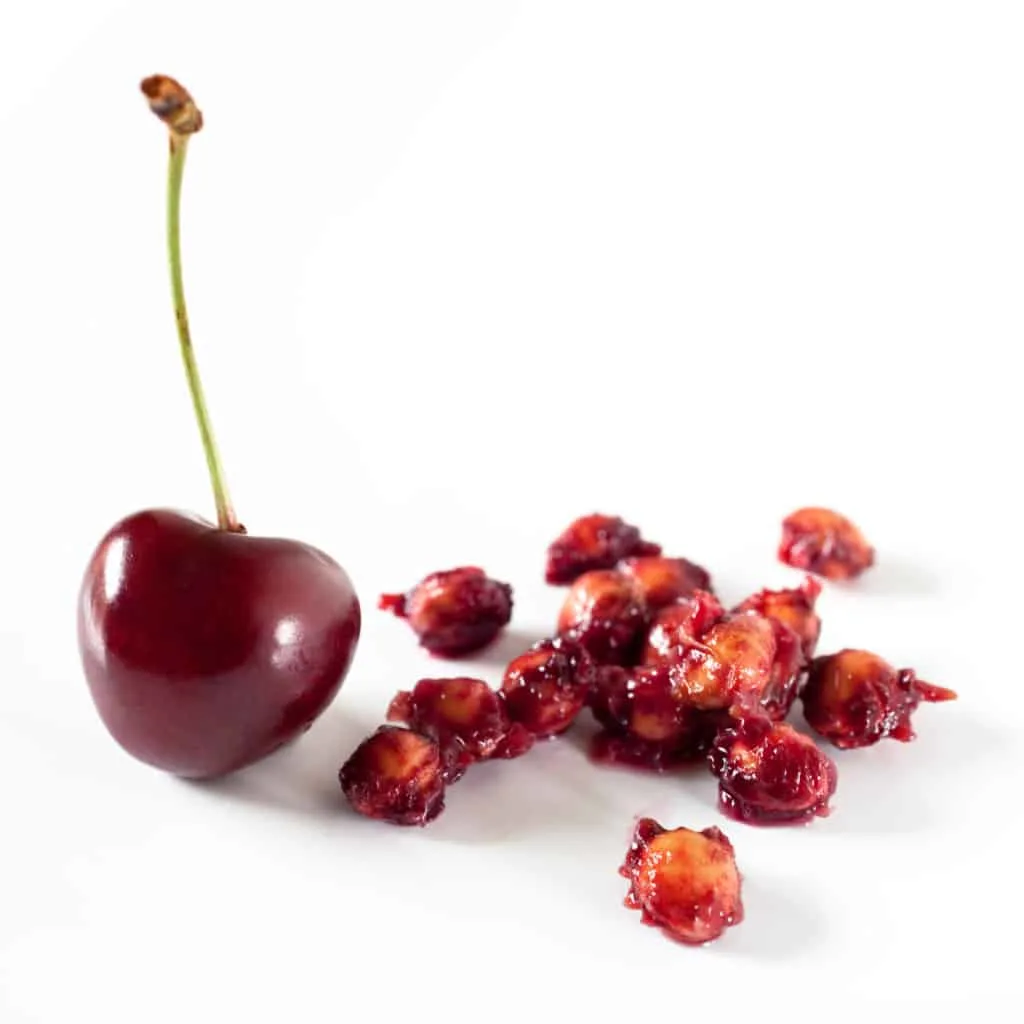
Like peaches, the danger here does not lie in the fruit itself. The fruit of a cherry is fine for your German Shepherd to eat (it contains nutrients and fiber which is good for your dog).
And also like peaches, you should avoid feeding your dog any that are jarred or canned, as they contain excess sugar.
The real danger lies in the pit of a cherry. A cherry pit contains cyanide. Yes, cyanide.
But rest assured there is no need for alarm if your German Shepherd ingests a single cherry pit. However, if your dog has eaten multiple cherry pits, contact your veterinarian.
The bigger danger with a cherry pit is that even a single one could cause some type of intestinal blockage. So if you know that your dog has eaten a cherry pit, just keep a close eye on it and make sure that it’s business as usual. If there is an issue it will likely present itself with vomiting, or constipation or a decreased appetite.
Symptoms if ingested:
- Vomiting
- Constipation
- Decreased appetite
Final thoughts
It’s very important to keep your German Shepherd away from all of the food items listed above. In the event that your dog does consume any of the listed items, keep a close eye on them and if you feel in slightest that there is something more serious going on, do not hesitate to contact your veterinarian immediately.
We sometimes pass things off with our dogs a little too easily, because we think that they are resilient and can handle them. In my case, I always play it safe, and I would much rather pay for a vet bill then have something harmful happen to my dog. I highly suggest that you err on the side of caution as well.
The main point is to just be careful. Treat your dog like your child – monitor where it goes and what it eats, and just keep it out of harm’s way. That’s the best way to ensure happy healthy life for your German Shepherd.
